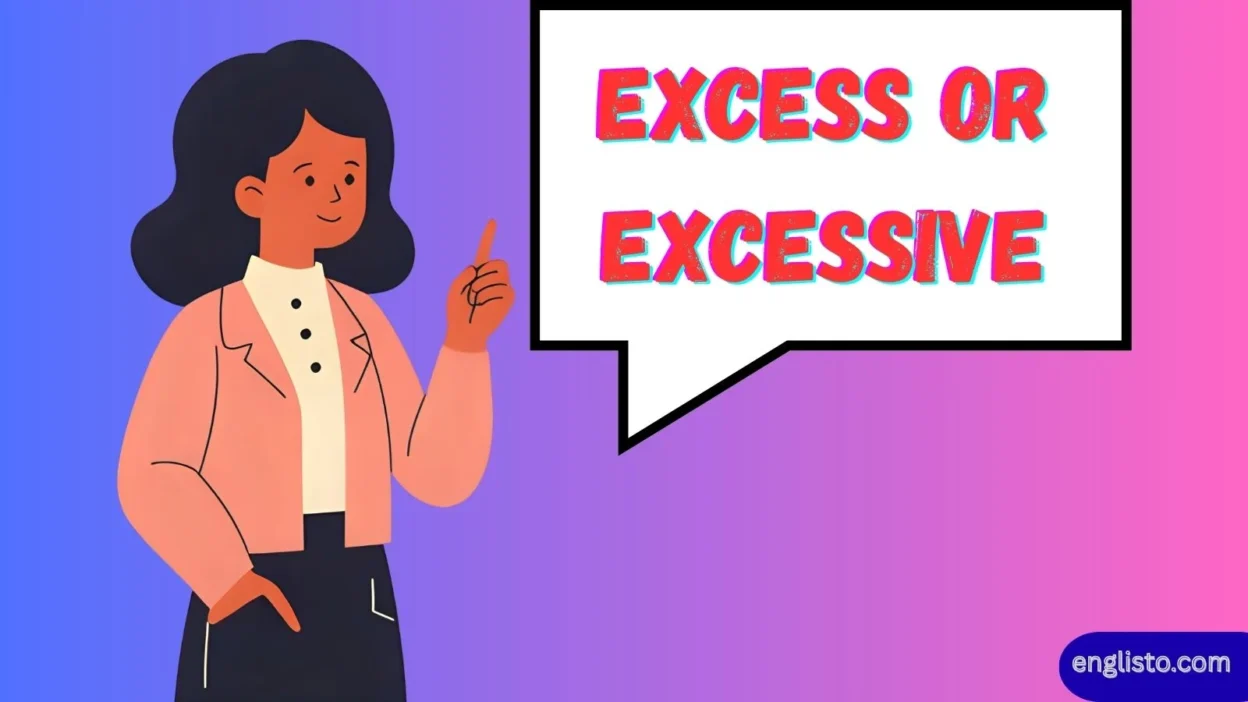Language is powerful. The way we choose words can shift meaning, change tone, and even influence perception. Two words that often trip people up are “excess” and “excessive.” At first glance, they look almost the same, but their functions, nuances, and connotations differ. Excess or Excessive.
In this guide, we’ll break down their meanings, grammar roles, and everyday applications. You’ll see clear examples, usage tips, synonym comparisons, and even real-life contexts—ranging from food, fitness, and finance to law, culture, and communication.
What Does “Excess” Mean?
“Excess” is primarily a noun, though it can also function as an adjective in certain contexts. It refers to an amount that goes beyond what is necessary, usual, or desirable.
- As a noun:
- “He was charged an excess fee by the travel agency.”
- “Eating in excess of 1800 calories a day may lead to weight gain.”
- “He was charged an excess fee by the travel agency.”
- As an adjective:
- “The shop charged him for excess baggage.”
- “Excess materials were disposed of after the construction project.”
- “The shop charged him for excess baggage.”
In both cases, the core idea is the surplus—something beyond the required or appropriate level.
Read More: Is “Are” Capitalized in a Title? The Complete Guide
What Does “Excessive” Mean?
“Excessive” is an adjective. It describes something that is too much, immoderate, or beyond reasonable limits. Unlike “excess,” it carries a negative connotation.
- “The teacher gave an excessive amount of homework.”
- “Excessive drinking can lead to health problems.”
- “She wore excessive makeup for a casual event.”
It’s not just “more than usual”; it’s over the top, harmful, or unreasonable.
Grammar and Word Choice: “Excess” vs. “Excessive”
Here’s a quick comparison to help you decide which word fits your sentence:
| Feature | Excess (Noun) | Excess (Adjective) | Excessive (Adjective) |
| Meaning | Surplus, amount beyond limit | Additional, leftover | Too much, immoderate |
| Part of Speech | Noun | Adjective | Adjective |
| Connotation | Neutral/Contextual | Neutral | Negative |
| Example | Excess of sugar | Excess baggage | Excessive sugar intake |
Rule of Thumb:
- Use excess when talking about a measurable quantity.
- Use excessive when describing something unreasonable or harmful.
Real-Life Usage Examples
Let’s look at how both words show up in different aspects of life:
Food & Health
- Excess: Consuming excess calories leads to weight gain.
- Excessive: Excessive sugar intake causes health problems like diabetes.
Fitness
- Excess: The athlete carried excess weight after the holiday season.
- Excessive: Excessive exercise without breaks can lead to burnout.
Money & Finance
- Excess: The insurance company charged an excess of £215 for claims.
- Excessive: Excessive spending led him into debt.
Travel & Lifestyle
- Excess: The airline fined passengers for excess baggage.
- Excessive: The hotel charged an excessive fee for room service.
Synonyms: When to Use Alternatives
Sometimes, swapping words sharpens your writing.
| Context | Synonyms for “Excess” | Synonyms for “Excessive” |
| Food & Diet | Surplus, Over, Leftover | Overeating, Overindulgent, Immoderate |
| Money & Finance | Extra, Addition, Balance | Exorbitant, Unreasonable, Overpriced |
| Behavior | Overflow, Redundancy | Over-the-top, Intemperate, Extreme |
| General | Superfluous, Spare, Remainder | Needless, Overdone, Disproportionate |
Common Mistakes and Confusions
Many learners—and even native speakers—confuse these two. Here’s how:
- ❌ “He was fined for excessive baggage.”
- ✅ “He was fined for excess baggage.”
- ❌ “She ate in excess cake.”
- ✅ “She ate cake to excess.”
- ❌ “The company faced excess spending.”
- ✅ “The company faced excessive spending.”
Tip: If you can replace the word with “too much”, go with excessive.
Positive vs. Negative Connotations
While “excess” is often neutral, “excessive” leans negative.
- Excess: Neutral, factual. “The warehouse has an excess supply of materials.”
- Excessive: Negative, judgmental. “The boss gave us excessive tasks that drained our energy.”
Think of excess as quantity and excessive as quality (bad quality at that).
Idioms and Expressions with “Excess”
- “To excess” – Doing something too much.
- “He drank to excess at the party.”
- “He drank to excess at the party.”
- “Excess baggage” – Both literal (airport bags) and metaphorical (emotional burdens).
- “In excess of” – More than.
- “The project cost in excess of $1 million.”
- “The project cost in excess of $1 million.”
Notice that “excessive” doesn’t appear in idioms—it’s more evaluative than idiomatic.
Cultural and Social Contexts
- Law & Contracts:
- “Excess” refers to financial amounts (excess damages waived).
- “Excessive” appears in terms like excessive force or excessive punishment, both legal criticisms.
- “Excess” refers to financial amounts (excess damages waived).
- Health & Well-being:
- “Excess calories” = surplus intake.
- “Excessive drinking” = dangerous habit.
- “Excess calories” = surplus intake.
- Art & Literature:
- “Excess” can mean overuse of materials (paint, decorations).
- “Excessive” signals exaggerated writing, bloated prose, or over-the-top style.
- “Excess” can mean overuse of materials (paint, decorations).
Table: Contextual Word Choice
| Context | Correct Word | Example |
| Diet | Excess | Excess fat in the body can cause health issues. |
| Diet | Excessive | Excessive salt in the recipe ruined the dish. |
| Travel | Excess | Passengers were charged for excess luggage. |
| Travel | Excessive | The airline imposed excessive fees. |
| Finance | Excess | The company had excess inventory. |
| Finance | Excessive | Excessive debt led to bankruptcy. |
| Behavior | Excess | He spoke with excess enthusiasm. |
| Behavior | Excessive | His excessive sarcasm offended the class. |
Key Takeaways
- Excess = noun/adjective (neutral, quantity)
- Excessive = adjective (negative, intensity/degree)
- Use excess for measurable amounts.
- Use excessive when the action or quality is over-the-top and undesirable.
FAQs
Q1: Can “excess” and “excessive” be used interchangeably?
No. “Excess” deals with amount or surplus; “excessive” judges it as unreasonable.
Q2: Is “excessive” always negative?
Yes, it usually implies harm, waste, or something beyond acceptable limits.
Q3: Which is correct: “excess drinking” or “excessive drinking”?
“Excessive drinking” is correct because it refers to unhealthy overconsumption.
Q4: Can “excess” be plural?
Yes. “The company trimmed several excesses from its budget.”
Q5: Is “to excess” the same as “excessive”?
No. “To excess” is an idiom meaning “too much,” but “excessive” is a descriptive adjective.
Conclusion
Choosing between “excess” and “excessive” isn’t just a grammar issue—it’s about precision and tone. “Excess” identifies surplus, while “excessive” criticizes it. Whether you’re writing about food, finance, law, or lifestyle, the right choice makes your message clear, professional, and impactful.
By understanding these distinctions, you’ll avoid common pitfalls, sharpen your communication, and use English with more nuance and confidence.



